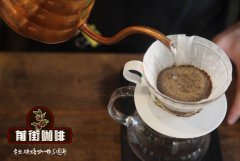El Salvador Green Hills Manor Coffee introduction what are the producing areas of El Salvador coffee?

Professional coffee knowledge exchange more coffee bean information please follow the coffee workshop (Wechat official account cafe_style)
Active volcanic activity brings mineral-rich volcanic ash to the country, and the soil dominated by volcanic ash contains more minerals and less organic matter, so in order to maintain its geographical position and make up for the lack of organic matter, farmers in the country will use the pulp residue of treated coffee beans or organic matter under coffee trees as fertilizer to make up for the lack of organic matter in the soil, so that the planting of coffee trees can produce coffee beans with harmonious taste. The country's most meaningful initiative is to introduce organic agriculture to the world, cultivating more than 150000 tons of organic coffee every year.
Sa coffee has five major producing areas (Apaneca, Central Belt, Chichontepec, Tecapa)
& Cacahuatique Mountain Range), generally distributed in the alpine slopes or plateau areas covered with volcanic ash at an altitude of 1200 meters, and the coffee harvest and harvest season is from November to April of the following year. As coffee prefers a mild climate, coffee trees are mainly planted in the shade of tall trees (shade grown coffee) in order to avoid excessive temperature and direct sun exposure, affecting the quality of coffee beans.
The coffee beans produced by it belong to Arabica species, mainly from Pacas and Bourbon brands, and belong to big beans with sweet taste and excellent flavor.
The Green Hills Manor in El Salvador, which has been growing coffee for more than 150 years, is currently managed by the Alvarez family, which has been growing coffee in El Salvador for a century.
The coffee growing site of the Green Hills Manor is located on the lush green hills of Santa Ana, in the west of El Salvador, which provides rich volcanic soil and an ideal mild climate, making it an excellent condition for cultivating coffee trees.
The Alvarez family supports the local community by providing free schooling and health check-ups for children aged 5-15.
And the family holds a commitment to natural ecological conservation and environmental protection and does apply it to coffee cultivation.
All the coffee produced by the green hill manor is protected by shade trees, which not only protects the coffee from direct sunlight, but also protects the soil. On the other hand, it also provides habitat for birds and other wild animals.
What is even more commendable about the manor is that it also provides a shelter for stray animals and abandoned animals to have a warm home.
The El Borbollon, owned by the Alvarez family, has been growing coffee in El Salvador for more than 100 years and is now run by a fifth generation of successors. The coffee processing plant comes from two nearby estates, one is LaReforma, which was founded by Rafael Alvarez Lalinde in 1892 and is owned by the same family as the processing plant.
The Bobolong processing plant is now managed by Eduardo Alvarez.
El Salvador is the country where Sasa has conducted the largest regional bidding in recent years under its own brand, Project of Origin (Project Origin). Under this model, many beautiful flavors are also collected, which makes coffee people flock to it. In 2018, Sakatani challenged the Japanese barista contest in Japan and entered the finals by using this brand of coffee beans in El Salvador.
END
Important Notice :
前街咖啡 FrontStreet Coffee has moved to new addredd:
FrontStreet Coffee Address: 315,Donghua East Road,GuangZhou
Tel:020 38364473
- Prev

Introduction of coffee flavor characteristics of Guava Plain in Guatemala New Oriental Coffee producing area
Professional coffee knowledge exchange more coffee bean information please follow the coffee workshop (Wechat official account cafe_style) Guatemala is one of the most important coffee producing countries in Central America, with long mountains and different regional climate, which has created eight major coffee producing areas in the country, all located on the highland topography in the subtropical climate, rich and stable rainfall and fertile volcanic ash.
- Next

SL28 Coffee Costa Rica Chispita Gold Honey Treated Flavor
Professional coffee knowledge exchange More coffee bean information Please pay attention to coffee workshop (Weixin Official Accounts cafe_style) Costa Rica coffee is the most stable quality among Central American coffee, the most important is that coffee grows under the shade of complete trees and cool rainy nights and in the natural environment with large temperature difference between morning and evening, plus rich soil and stable and progressive middle and later treatment make Costa Rica
Related
- Does Rose Summer choose Blue, Green or Red? Detailed explanation of Rose Summer Coffee plots and Classification in Panamanian Jade Manor
- What is the difference between the origin, producing area, processing plant, cooperative and manor of coffee beans?
- How fine does the espresso powder fit? how to grind the espresso?
- Sca coffee roasting degree color card coffee roasting degree 8 roasting color values what do you mean?
- The practice of lattes: how to make lattes at home
- Introduction to Indonesian Fine Coffee beans-- Java Coffee producing area of Indonesian Arabica Coffee
- How much will the flavor of light and medium roasted rose summer be expressed? What baking level is rose summer suitable for?
- Introduction to the characteristics of washing, sun-drying or wet-planing coffee commonly used in Mantenin, Indonesia
- Price characteristics of Arabica Coffee Bean Starbucks introduction to Manning Coffee Bean Taste producing area Variety Manor
- What is the authentic Yega flavor? What are the flavor characteristics of the really excellent Yejasuffi coffee beans?

